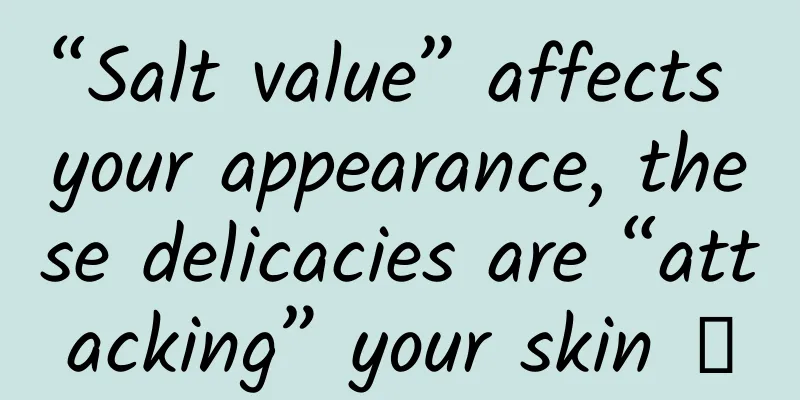“Salt value” affects your appearance, these delicacies are “attacking” your skin →

|
Review expert: Wang Xuejiang, professor at Capital Medical University When you get together with friends on weekends, do you want to have hot pot or barbecue? Crayfish, hot pot, barbecue, maocai, spicy strips, potato chips... these "food assassins" that make people unable to stop are quietly destroying our skin's defenses. How can the delicious food we eat affect our skin? The impact of the three heavy-flavor giants on the skin Heavy-tasting food usually refers to those dishes that are salty, spicy, and greasy. These foods often contain more salt, sugar, oil and other condiments. Long-term preference for heavy-tasting food may indeed affect the condition of the skin and even reduce the appearance. High salt: "Salt value" affects your appearance. Long-term intake of high-salt foods may cause skin cells to lose water, and the water content of epidermal cells and subcutaneous tissues to decrease, making the skin dry, flaky, and even rough and dull . Excessive salt intake can also induce chronic skin inflammation, which manifests as redness, itching, and recurrent acne. A research team from the University of California, San Francisco, published a study in the Journal of the American Medical Association Dermatology showing that eating an extra gram of salt per day increases the risk of atopic dermatitis by 22%. Salt can also cause melanin deposition, aggravating chloasma and freckles. The salt in sweat catalyzes photoaging under ultraviolet rays. In addition, high-salt, spicy foods stimulate appetite, which can easily lead to overeating and excess calories, causing obesity, while fat accumulation and slowed metabolism can cause the skin to become loose and create cellulite. High sugar: High-sugar foods are the "sweet killer" of collagen, which can cause blood sugar fluctuations, lead to glycation reactions, and make collagen "rusty". The face collapses at a speed comparable to cliff-like aging, causing the skin to lose elasticity and become dull. Sugar can also stimulate insulin to soar, aggravating problems such as rosacea and seborrheic dermatitis. High in fat: Fatty and greasy foods can aggravate inflammation in the body, and excessive intake can also lead to excessive oil secretion in the skin, clogged pores, and cause acne and other problems. Related studies have confirmed that a high-fat diet can affect hair follicle stem cells, leading to hair loss and decreased skin regeneration ability. How to reduce the damage of heavy flavors to the skin Adjust your diet and habits, replace regular salt with low-sodium salt, reduce your daily intake, and choose low-GI foods. Low-GI foods (i.e. foods with a low glycemic index) have a lower absorption rate in the gastrointestinal tract, which helps control your weight, reduce hunger and the possibility of overeating. Replace animal oils with olive oil, linseed oil, etc., and reduce the consumption of pastries made with non-dairy creamer and shortening, and try to avoid the intake of trans fatty acids. In addition, eating more fruits and vegetables rich in antioxidants and ensuring adequate water intake can help keep the skin hydrated and reduce dryness and wrinkles. Increasing dietary fiber can regulate intestinal function and reduce oil secretion. Controlling sugar intake and maintaining a balanced diet can provide more nutrition for the skin. Of course, in addition to controlling our diet, we can also adjust our work and rest schedules, exercise moderately, and promote skin metabolism so that the skin can better repair itself and excrete toxins accumulated by heavy-tasting diets. Dietary tips: Not salty does not mean no salt Some foods may not seem salty when they are eaten, but they are actually high in sodium. They make people consume large amounts of salt without realizing it, which invisibly changes our taste buds' expectations and gives us a heavy taste. Learn to check the "sodium content" in the nutrition facts table (1 gram of salt ≈ 400 mg of sodium). These foods contain "hidden salt": Preserved fruits and candied fruits taste sweet and sour, but they actually have a lot of salt added; Additional salt is also added to the noodles to increase the toughness of the noodles and make the taste better; Cheese needs to be coated with salt during the production process, but the saltiness will be masked by the aroma and sweetness of the cheese; Salt is also added during the production of some breads and biscuits . The damage caused by heavy-flavor diet to the skin is a gradual and cumulative process. We can reduce the dependence on "salty, sweet and oily" in our daily diet and let the skin gradually break out of the "salt trap". |
<<: What can you do before going to bed to promote the secretion of growth hormone?
Recommend
The correct walking posture for girls
The walking posture of girls and boys is complete...
How long does it take for the hcg injection to be metabolized?
Many women have heard of hcg in their daily lives...
Women in adolescence should beware of four major diseases: acne, dysmenorrhea, abnormal leucorrhea
1. Acne I believe everyone will have acne during ...
Are ovarian cysts painful? Authoritative experts tell you the answer
When the ovarian cyst is still relatively small, ...
If you have these 3 habits when brushing your teeth, it's the same as not brushing at all. Here's a trick that's as effective as washing your teeth.
Good oral hygiene leads to good health. Oral hygi...
Several cases of abnormal leucorrhea in women
What are some cases of abnormal leucorrhea in wom...
Stroke: Prevention, Recognition and Emergency Care
Stroke, commonly known as "stroke", is ...
What are the dangers of having hemorrhoids?
Many people suffer from hemorrhoids in life, espe...
Why can't Tremella be cooked? How to cook Tremella so that it can be cooked easily
As we all know, Tremella is a common delicacy. It...
Bleeding during intercourse with Mirena
The Mirena IUD is an effective contraceptive meth...
How long does it take to recover from ovarian hyperstimulation?
In life, many people suffer from ovarian hypersti...
Pregnancy pain in buttocks and waist
If you feel pain between your buttocks and waist ...
What to eat during menstrual period when the amount of blood is light
Female friends find it difficult to give up their...
What to do if you enter menopause early
People go through many stages in their lives, inc...
Unbearable vaginal itching
The female vagina is very sensitive. If affected ...









